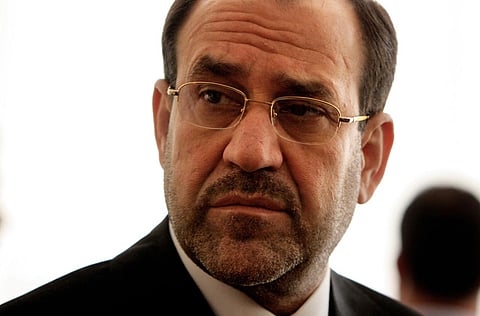Iraq PM Al Maliki to name cabinet on Monday
Iraqi Prime Minister Nouri Al Maliki will present his cabinet on Monday, an aide said

Baghdad: Iraqi Prime Minister Nouri Al Maliki will present his cabinet on Monday, an aide said on Saturday, potentially bringing an end to nine months of political impasse after inconclusive March elections.
The government of national unity will include members of the Iraqi parliament’s four main political blocs representing Shiites, Sunnis and Kurds, and comes with around a year to go before US troops are to withdraw completely.
The announcement came as parliament voted to overturn controversial bans placed earlier this year on three members of a Sunni-backed political bloc for their alleged ties to Saddam Hussain’s Ba’ath party.
“This morning, I presented a request to the presidency of the parliament from the prime minister for a session to be held on Monday to present the cabinet,” Minister of State of Parliamentary Affairs Safaldin Al Safi told AFP.
“If Al Maliki finds that the candidates for a ministry are not suitable, he will take responsibility as acting minister in that ministry until a replacement is found,” added Safi, who is also interim commerce minister.
Al Maliki's State of Law coalition won 89 seats in Iraq's March 7 elections, two fewer than the Iraqiya bloc of ex-premier Eyad Allawi. However, neither won enough for a parliamentary majority, triggering an impasse that is only now being resolved.
A power-sharing deal last month finally broke the deadlock, with Al Maliki being named Prime Minister-designate on November 25 and given 30 days to name his government.
Safi said the defence minister would be a member of Iraqiya while the interior minister would come from the pan-Shiite coalition of which State of Law is the biggest component.
As a condition for agreeing to the deal, Allawi demanded that pre-election bans on several of his bloc's members for alleged ties to Saddam's regime be overturned, and a new statutory body be created to oversee security matters with him at the helm.
Based on those demands, three members of Iraqiya had their bans overturned in parliament on Saturday by a vote of 109-61. Iraq's Council of Representatives has 325 seats, with quorum requiring 163 lawmakers.
A ban on a fourth politician had been expected to be lifted, but the body that made the original call to bar him, the Justice and Accountability Commission (JAC), failed to send a required letter to parliament asking that his name be cleared.
It was not immediately clear why the letter was not delivered.
Two of those whose bans were lifted and the politician who remains barred were all MPs in the previous parliament, but will not sit in the present one. The overturning of the bans allows them to resume participation in politics.
The bans generated widespread controversy as they were perceived as disproportionately targeting Sunni Arabs, and the two heads of the JAC were themselves running for parliament on a rival Shiite list.
A statement issued on behalf of the three politicians who had their bans overturned, and read aloud in parliament, said they condemned "the Baath party and the practices of the Baath party."



